“Bob’s Burger” is a sleeper hit animated adult show that started in the shadow of gigantic hits such as “South Park”, “The Simpsons” and Seth MacFarlene’s multiple shows; however as time went on, the show gained attention due to the confluence of its notably likeable characters, well-written humour, and for focusing on a functioning though financially precarious family. Nowadays “Bob’s Burger” is regarded as one the best currently-running animated shows on the Television landscape and it’s not hard to see why. Woven throughout the myriad of individual tales of the week “Bob’s Burgers” tells a simple yet enduring story of a family who, despite communally running a struggling restaurant love and support each other. The show also has a very accurate, non- stereotypical neurodiverse teenage girl in the character of Tina, providing great representation. Along with visualizing characters often not seen in the tv- scape the interplay of the cast often showcases actions which subvert and often avert common gendered stereotypes and tackles the struggle with ordinary but always stressful, economic issues in subtle and complex ways. “Bob’s Burger” has been discussed on this blog before, back when the show had only one season out, and per this writing they are engaged with season eight of their still strong run.
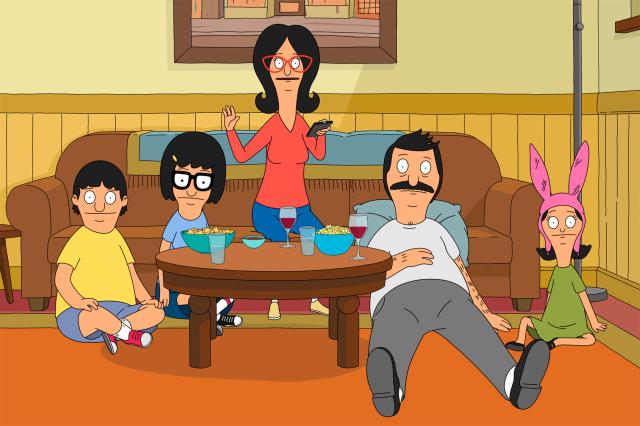
“Tina and the real ghost”, is the second episode from Season five and that seasons Halloween special. The episode starts in an appropriately spooky manner with a repair man refusing to go into the restaurant’s basement, with the adamant rebuttal that there lingers an unnatural spirit in the dark abodes of the basement. Bob is annoyed by the unprofessional behaviour, but his wife Linda and the kids get excited at the idea of a haunted storage room laying beneath the restaurant and their home. The family decides on the rational action of spending the fateful hours of the night using a Ouija board in an attempt to contact the alleged wandering spirit. While using the board, the family is informed that the ghost’s name is Jeff, and after some clever manipulation and outlandish commotion they decide that they have to lure the ghost into a shoebox where it remains captured. The children are thrilled with the idea of having a ghost in a box, seeing it as an odd form of friend or pet.
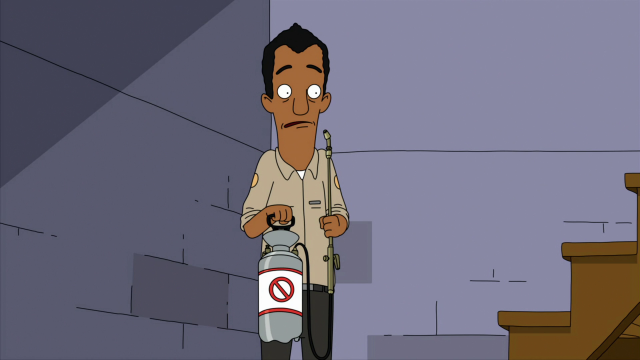
While Gene and Louise use the box to get attention from the other kids at school and Bob uses the image of a “haunted restaurant” for free publicity, Tina develops the beginnings of a relationship with Jeff the (supposed) Ghost. Taking the box on a date to a butterfly conservatory (Butterfly houses are enclosures for the breeding and display of butterfly populations) and after a butterfly lands on her mouth, Tina sees this as a sign of communication with Jeff of the most intimate display. Tina, now enamoured of the subtle moves of Jeff takes the box to school, where having a ghost boyfriend leads to Tina becoming quite popular.
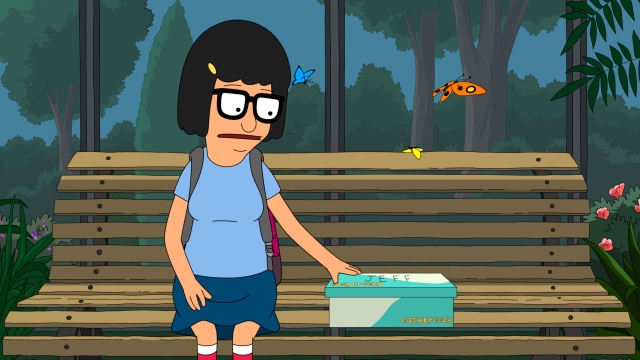
The undeniable attention Jeff and his shoebox gives to the once wallflower Tina creates a seething jealousy in the main bully Tammy. With Tammy agreeing to the obviousness of Jeff’s reality only to set the stage for a break up between Tina and Jeff, and acquiring the shoebox, and Jeff’s affection, for herself. Once again Tammy ascends to the top of the Popularity summit and Tina finds herself forlorn at school and in love. Whilst Tina mourns her loss, Louise, in her guilt at Tina’s breakdown, admits to the parents, Bob and Linda, that she played a prank on the family during the Ouija board event and move the planchette (the moveable pointer on the spirit board) to emulate a spectre and give this young ghostly presence the name Jeff. Louise tormented by her sisters pain desires to admit her deceit to Tina, but the Bob and Linda argue against this course of action to spare Tina from further sorrow. This plot twist, where the parents suggest further deception, sets up the episodes climax.
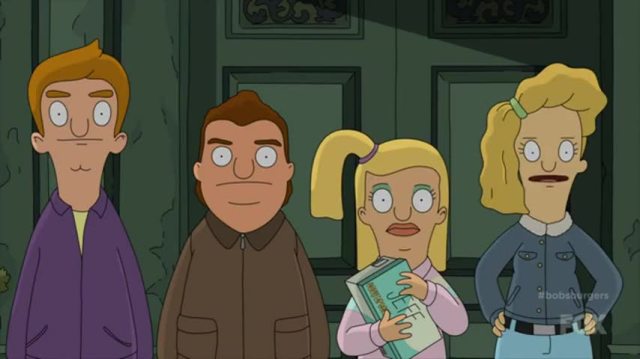
Left to right: Jimmy, Zeke, Tammy and Jocelyn
Now All Hallows eve has come around and the Belchers (the family name) children go trick-or-treating. Tina, putting on a brave face, joins her peers, including Tammy with the shoebox, and her siblings for the night. Deciding to promote the evening of Halloween eve by entering a graveyard, Things take a further creepy and unsettling turn when the group decides to enter a mausoleum.
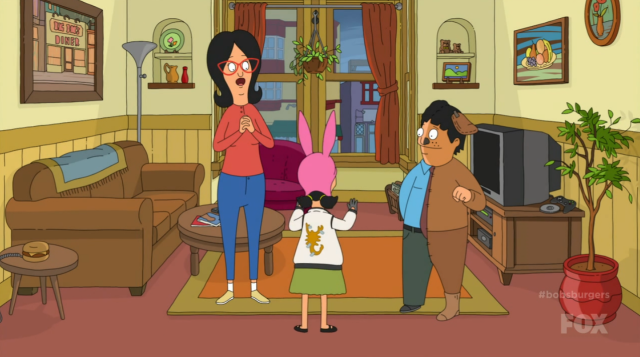
As per the usual, the door to the crypt slams shut and after all attempts fail to reopen the mausoleums’ door, the already fearful group discover a message written on the wall: “You are all trapped in here forever, signed Jeff”. Naturally panic ensues and Tammy repents of her actions in absconding with both box and Jeff. Hearkened by this situation, we as the audience are relieved as we feel the protagonist Tina will not be further bullied, but the shock comes when Tina, herself, notes that Jeff isn’t real. Tina confesses her doubts about the reality of the spectral plane and her only half playful acceptance of Jeff as existing. Noting her suspension of doubt bout ghosts was finally cut short when her suspicion of the fantasy of the ghostly world was confirmed when she overheard Louise’s confession to her parents.
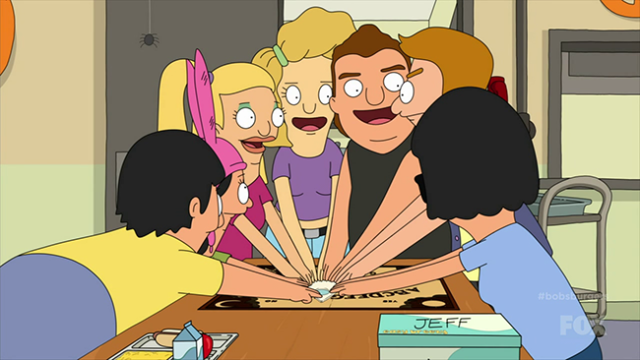
Tina starts to wonder about her own suspension of disbelief. Why did she embrace the nothingness of the myth of the ghost? She concludes to her group of friends and siblings that Jeff or his world of the spectral realm isn’t real, but the things that are desired from him still are. Jeff embodies cravings, wants and desires unfulfilled and nebulous. Tina wanted a boy to pay attention to her. Zeke, one of the kids in the gang, admits that he believed in Jeff because he desperately wanted to believe in an afterlife. Gene wanted someone to watch TV with. After the group has their epiphany, Tina states: “But we don’t need Jeff to get these things from ourselves”. The conversation is continued with: “It’s ok (that there is no afterlife) it just means we have to take advantage of the here and now”. Tina calls on herself, without a Jeff, to embrace herself. Tina shows Gene that one can watch Tv by himself (it is no reflection of being unwanted) and (as rule of funny) the group tells Tammy to stop being mean and horrible. The Group makes peace and Tina gets complimented on her prankster skills as it is revealed that she had planned and executed the entire evening.
This scene introduces in a simple, yet a very authentic depiction of arguments about the meaning of existence in a transcendental world and of sceptic response that no underlying (transcendental) world is needed to give meaning to human existence. Commonly this argument goes that without the meaning given by another (outside, higher world) there would be no meaning to this world. In this episode of ”Bob’s Burger” Tina gives a response to this rhetoric of transcendental meaning, while also understanding why some have the need for beliefs in the supernatural. The Graveyard scene is stage as a discussion of how people, for various reasons, attempt to seek comfort, hope and affirmation through their beliefs. As Tina understandably wants attention from the opposite sex, Gene desires acceptance and company, and Zeke finds the idea of life being short and eventually final terrifying. The episode operates as an honest, yet sympathetic portrayal of the many reasons for the superstitious or the belief in afterlife, but at the end of the narrative story, Tina herself, stands for the truth in the world we live in. Life and the world we live in give meanings as bounty, but often unseen in our doubts and insecurities. At last, tells Tina, life – being short and inevitably temporary – is therefore precious and should be treasured. To say yes to things, like doing things by yourself. Find meaning, especially in what makes you happy. And, as in Tina’s case, meaning is empowering oneself instead of looking for validation elsewhere.
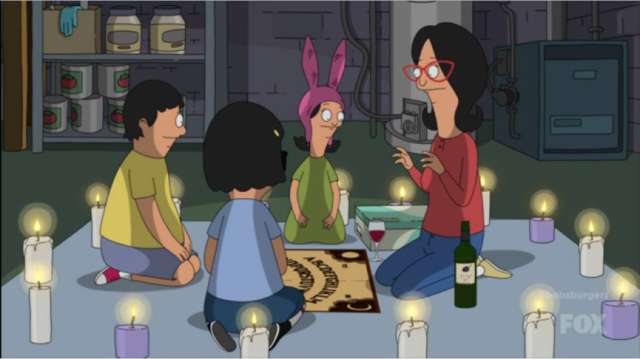
“Bob’s Burger” is interesting not only in showing a working class family with subversive gender presentation, but also provides interesting and subtle secular depictions as well. Unlike most family centric television narratives in the west, where the main leads mention or go to church seemingly regularly, “Bob’s Burger” obviously avoids the embedding of religion both in its depiction of the family and the community. Jimmy’s, a character close to the family and a love interest to Tina, causally cements this gentle abandonment with the line and philosophy ”there is nothing after death, but that’s OK”.
As more of the western world turns towards a secular, world centred meaning system, presentation is important, as well as giving vital understanding of where people of the current contemporary moment exist as life and philosophy. The scene with the kids in the mausoleum gives a pitch-perfect depiction of such. It is honest and a sweet, optimistic alternative way of viewing life: we can give to yourselves meaning and importance, despite there being no supernatural forces.










































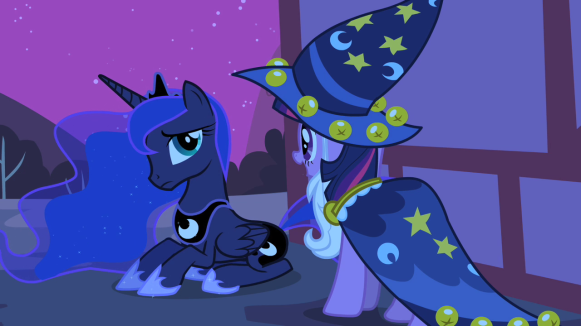
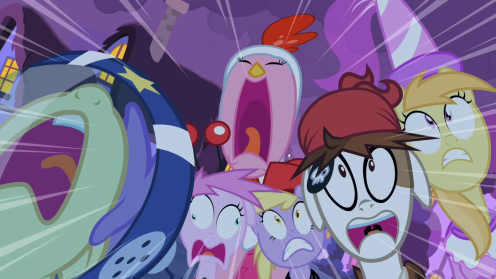



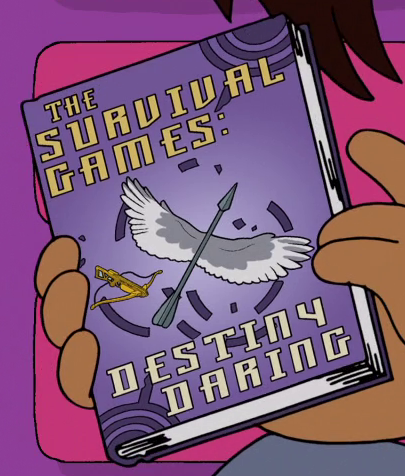


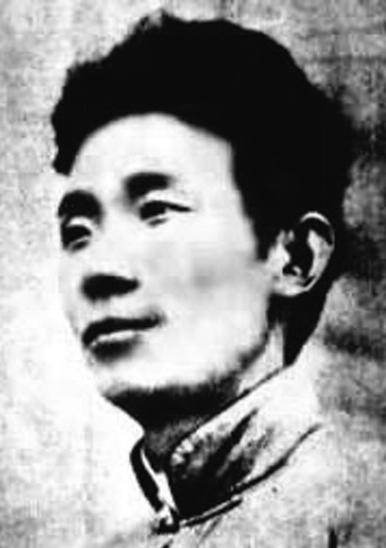



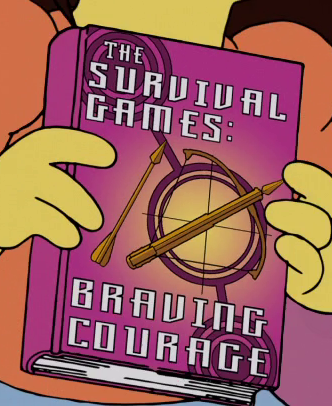
“If Only This Place Wasn´t Such A Bad Influence”: A review of “Moomins At The Riviera” (2014)
Film adaptations are a difficult prospect. How much to keep, what will translate well enough to the alternative media, how to avoid deforming and misusing the original source and its intentions. Especially in childrens media/culture, it is common for a screen adaptation to become lighter and unnecessarily softer, removing things that would be seen as “too depressing”/”scary”. Though certain subjects, or their presentation, may be problematic for children, it is still a fact that life itself is quite messy and at times unpleasant and saying otherwise to kids is just a gratuitous and deceitful deviation from the real. On top of that, children by nature are curious and often quite philosophical, and the world being the chaotic place that it is will lead to children experiencing things like death, divorce, bullying etc. to which literature can offer help in coping and understanding these issues. This inclination goes a long way to explaining why the “Moomins”-books, that are chock-full of philosophy and curiosity, have been so poorly adapted when it comes to cartoons and films. Therefore it is no small pleasure to say that in 2014, a fantastic adaption was made of the Moomin comic strip, “Moomins At The Riviera”.
left to right: Moominmamma, Snorkmaiden, Moomintroll and Moominpappa
The Moomin series started out as novels and comic strips, created by Tove Jansson who wrote the original eight novels, and add-ons, following the Moomin family and their friends. The novels delved into a slew of issues, including death, morality, family, loneliness and middle age crises. The characters who were primarily focused on were the naïve yet kindhearted Moomintroll, the wise, gentle Moominmamma, the angry adopted sister Little My, Moomintrolls vain yet tough girlfriend Snorkmaiden, and the proud Moominpappa. The comics, outside of the novel series, were initially written by Tove Jansson, and then later were run by her brother Lars Jansson. The comic strip was massively popular in England and Japan, and is regarded to this day as Finland’s most popular comic strip. However, inside of the Moomin-fandom they are slightly controversial; some fans love them, some fans dislike them and feel like the novels are fair superior. There is also a third camp (in which I am in) that feel like the comics are at times great, at times lacking.
The animated film “Moomins at the Riviera” (2014) is based on a comic strip arch that satirized class and social norms, but the comic arch suffered from a poorly written Moomintroll – he was written as a bit possessive and unkind to Snorkmaiden in the original comic strip. The animated film adaption keeps the satirical elements, while also improving on the character development.
As the film begins, the viewer is introduced to the Moomins and their friends. Life in their valley is relaxed, tolerant, and blissfully tranquil. However Snorkmaiden reads about a fancy hotel in a magazine, and after telling the rest of the gang about the fantastic place she´s read about, they decide to embark on an adventure to find this hotel. When they get there, it turns out that their adventure becomes more of a misadventure. Snorkmaiden gets caught up in the superficial glamour, Moominpappa gets swept up in his own pride and neglects his family, and Moomintroll after seeing Snorkmaiden flirt with others feels abused and abandoned. It is only Moominmamma who keeps her head high, trying to help her depressed son and other lonely creatures at the hotel. As Moominmamma points out: “If only this place wasn´t such a bad influence on us”.
While the humor and the characters are as loveable as in their book and comic counterparts, what makes this movie a wondrous continuation of the series (and also watchable to people not familiar with this franchise) is it´s witty, intelligent social commentary. At the films beginning the viewer is introduced to an honest, straightforward narration to the family´s philosophy. This is laid out in in the story line through a brief encounter with a lively band of self-proclaimed pirates. Moominmamma mistakes their feverish search through their home as a hunt for a missing “treasure” chest of tropical seeds she had found, while, in reality, and of course, the pirates were scavenging for the booty of a chest of gold. Moominmammas honest confusion at the pirates disregard for the seeds is comical, but also speaks volumes of the alternative lifestyle the Moomins live; that is, one not consumed by wealth or focused on the materialistic.
In the film version of “Moomins At The Riviera”, while being residence at the hotel, the gang for the first time has to cope with real judgment for their ways and mannerism. They are constantly too clumsy, too obscene, they don´t have the right clothing etc. Snorkmaiden however learns to blend in and Moominpappa is befriended by man from a high class family who´s impressed with Moominpappas “boheme” lifestyle. However Moomintroll becomes more and more helpless as Snorkmaiden becomes enamored with someone else.
Scene from original comic, duplicated in film
A clear rift is driven between the individuals of the Moomin band, yet despite this wedge sundering to the group Moominmamma and Moomintroll try their best to rekindle their old life. Moomintroll tries to woe Snorkmaiden with a boat trip, Moominmamma tries to help a dog who has an unfortunate fondness for cats. In one beautifully written scene, Moomintroll falls into a deep melancholy when he once again gets dogged by Snorkmaiden and ends up just sulking by himself. Moominmamma tries to engage Moominpappa in this, telling him “our son is a little down, maybe you could give him some advice?” which Moominpappa hand waves away as Moomintroll just being “philosophical”. With such simplicity the pain of the rift is made clear; popularity and outward glamour have in fact corrupted them.
It is also in Snorkmaidens and Moomintrolls conflict where the film becomes a superior production to the original comic. In the comic strips arch, Moomintroll has a tendency to get angry when Snorkmaiden wants to go to parties and has a habit to belittle her (which he never did in the books). However in the animated film production, he supports her desire to go to the hotel and doesn´t demean her as in the comics. Additionally his jealousy is explored more as a symptom born of his insecurities in light of his girlfriend openly flirting with strangers, as well as the hotel’s general alienating nature. In other words, he is more like the lovable Moomintroll from the books, which gets the audiences sympathy even in his more flawed moments.
The film, on top of its family dynamics and life style philosophy, also focuses sharply upon the issue of class. The Moomins are read by the hotels celebrities as poor due to their lack of knowledge of fancy food, of their lack of materials and appearance. This assumption creates a hostile attitude, but also naïve admiration; Moominpappa impresses a man from a well-to-do family who wants to “suffer for his art” and live as “the poor”, however he quickly abandons this notion when he lives upon common food for a day, and endeavors to sleeps outside for one night. His one day experiment in downward mobility ends with his exclamation “I´ve lived in poverty quite enough now”. This satire of the exotification of poverty is quick biting, and spot on.
“Moomins at the Riviera” is a fantastic film that loyal Moomin-fans and casual viewers will both love. The atmosphere is gentle despite the satire, the characters are instantly loveable and the themes resonate in an international tone. A must watch.